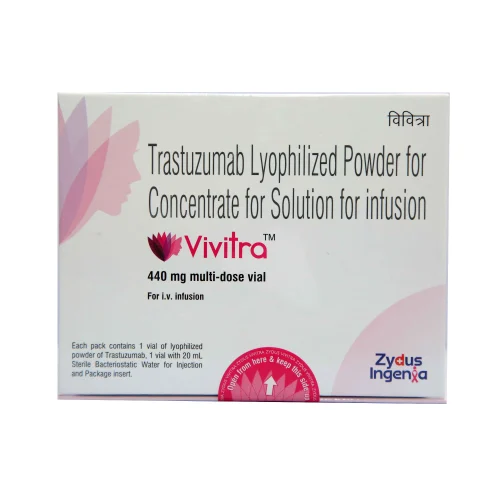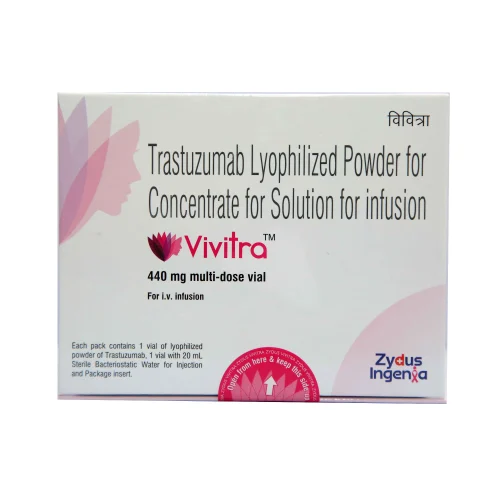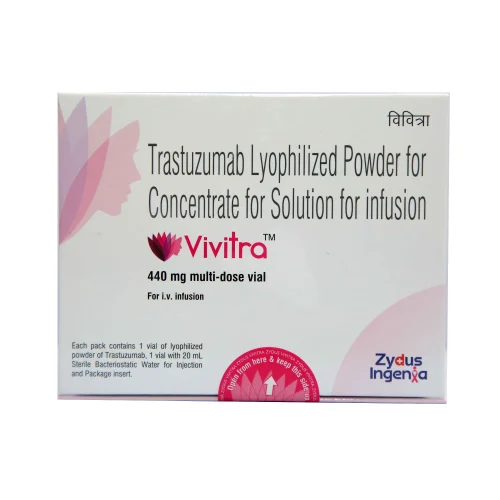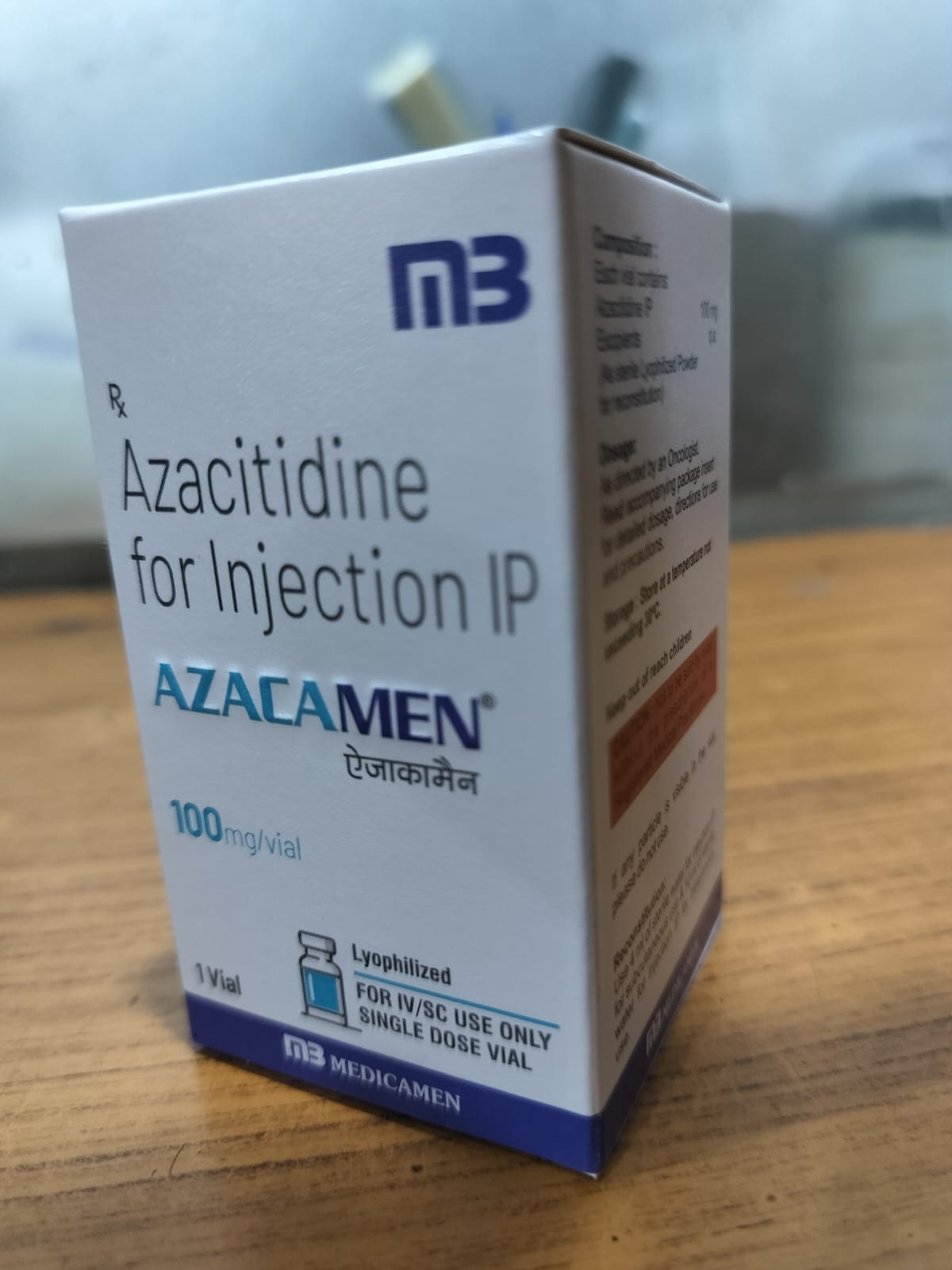Product Introduction:
Vivitra is a lyophilized powder formulation of Trastuzumab, a humanized monoclonal antibody developed for intravenous administration. It is indicated for HER2-overexpressing cancers and is often used in combination with chemotherapy or as a maintenance agent. This biosimilar offers a more accessible alternative to branded Trastuzumab (Herceptin), while maintaining equivalent efficacy and safety.
Uses (Indications):
Vivitra (Trastuzumab) is used in the treatment of:
-
HER2-positive metastatic breast cancer – as monotherapy or with chemotherapy
-
Adjuvant treatment of HER2-positive early breast cancer
-
HER2-positive metastatic gastric or gastroesophageal junction adenocarcinoma
-
Neoadjuvant (pre-surgery) treatment in breast cancer
-
Maintenance therapy after initial response
-
HER2-positive recurrence prevention in high-risk early breast cancer
Storage Instructions:
-
Store the vial at 2°C to 8°C (refrigerated)
-
Do not freeze
-
Protect from light and moisture
-
After reconstitution, the solution should be used within 28 days if refrigerated
-
Always follow cytotoxic handling protocols during preparation and disposal
How It Works (Mechanism of Action):
Trastuzumab binds with high affinity and specificity to the extracellular domain (subdomain IV) of the HER2 receptor, which is overexpressed in certain cancers. It acts by:
-
Inhibiting HER2-mediated signaling pathways (MAPK and PI3K/AKT) that promote tumor cell growth
-
Mediating antibody-dependent cellular cytotoxicity (ADCC)
-
Promoting cell cycle arrest and apoptosis in HER2-overexpressing cells
-
Enhancing the effect of chemotherapeutic agents such as paclitaxel, docetaxel, and cisplatin
Side Effects:
Common Side Effects:
-
Fever, chills
-
Fatigue
-
Diarrhea or nausea
-
Headache
-
Pain at infusion site
-
Upper respiratory symptoms (cough, sore throat)
Serious Side Effects:
-
Cardiotoxicity – especially in patients with prior anthracycline use or pre-existing heart disease
-
Infusion-related reactions – including fever, hypotension, dyspnea, and bronchospasm
-
Pulmonary toxicity – interstitial pneumonitis or ARDS
-
Anaphylaxis and hypersensitivity
-
Neutropenia and severe infections
-
Hepatotoxicity (rare)
Dosage (Typical Recommended Dose):
For Metastatic Breast Cancer (IV route):
-
Loading dose: 4 mg/kg IV infusion over 90 minutes
-
Maintenance dose: 2 mg/kg IV weekly over 30 minutes
For Adjuvant Treatment (IV route):
-
Loading dose: 8 mg/kg over 90 minutes
-
Maintenance dose: 6 mg/kg every 3 weeks over 30–90 minutes
For Gastric Cancer:
-
Loading dose: 8 mg/kg
-
Maintenance dose: 6 mg/kg every 3 weeks
Note: Dosing depends on body weight and treatment protocol (weekly or 3-weekly).
Method of Administration:
-
Administered intravenously via infusion pump
-
First dose over 90 minutes; subsequent doses may be shortened to 30 minutes if well tolerated
-
Premedication may be required for infusion reactions (e.g., paracetamol, antihistamines)
-
Must be administered by trained oncology personnel
-
Do not give as IV push or bolus
Precautions:
-
Baseline and periodic cardiac evaluation (ECHO or MUGA scan) is mandatory
-
Use with caution in patients with existing heart conditions or prior anthracycline exposure
-
Not recommended during pregnancy or breastfeeding – may cause fetal harm
-
Patients must use effective contraception during treatment and for 7 months after the last dose
-
Monitor for signs of infusion reaction, pulmonary symptoms, or liver abnormalities
-
Discontinue in cases of severe allergic reactions or significant cardiac dysfunction
Drug Interactions:
-
Anthracyclines (e.g., doxorubicin, epirubicin) – significantly increased risk of cardiotoxicity
-
Cyclophosphamide – increased bone marrow suppression
-
Live vaccines – avoid due to immunosuppression
-
Paclitaxel and docetaxel – often co-administered; monitor for cumulative toxicity
-
Use caution with NSAIDs or nephrotoxic drugs in renally compromised patients
Allergies (Warnings for Allergic Reactions):
-
Hypersensitivity may occur, especially during the first infusion
-
Symptoms include rash, fever, hypotension, chest tightness, and dyspnea
-
Severe cases can lead to anaphylaxis or respiratory distress syndrome
-
Emergency equipment and medications (e.g., epinephrine, corticosteroids) should be readily available
-
Discontinue if Grade 3 or 4 infusion reaction occurs
Overdose Information:
-
No specific antidote exists
-
Overdose may lead to severe cardiac dysfunction or respiratory compromise
-
Provide symptomatic and supportive care, including cardiac monitoring and fluid management
-
Hospitalization may be required in severe cases
-
Monitor cardiac function continuously
Missed Dose Instructions:
-
If a scheduled dose is missed, it should be administered as soon as possible
-
Do not double the dose
-
Adjust future schedule to maintain consistent intervals (weekly or every 3 weeks)
-
Consult the oncologist for a revised dosing plan
Additional Notes:
-
Vivitra is a biosimilar and meets international standards for efficacy, safety, and quality
-
Patients should receive patient education on signs of cardiac dysfunction and infusion reactions
-
May be used for up to 1 year in adjuvant breast cancer settings
-
Regular monitoring of LVEF (left ventricular ejection fraction) is critical during therapy
-
Trastuzumab has revolutionized treatment outcomes in HER2+ cancers, offering improved survival rates






